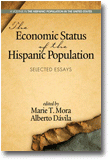
The Economic Status of the Hispanic Population
Selected Essays
Edited by:
Marie T. Mora, The University of Texas - Pan American
Alberto Dávila, The University of Texas - Pan American
A volume in the series: The Hispanic Population in the United States. Editor(s): Richard R. Verdugo, UAB - Centre for Demographic Studies, Barcelona, Spain.
Published 2013
In 2010, Hispanics represented one out of every six people in the U.S. (up from one out of eight in 2000), such that the economic status of this population has become increasingly important for the economic direction of the nation. This volume brings together a group of scholars who analyze a variety of socioeconomic issues (particularly those related to education, poverty, and health) to assess how Hispanics have been faring relative to other Americans. A common theme across the chapters is that Hispanics tend to lag behind non-Hispanics with respect to their economic outcomes. Despite this lag, however, some of the studies indicate that Hispanics have been making progress in terms of improving their relative economic position in recent years. Several of the chapters also discuss policy implications.
The intended audience includes social scientists, students, policymakers, and anyone interested in learning more about the economic conditions of Hispanic Americans. Many of the authors employed rigorous statistical methods to analyze the economic status of Hispanics, but the chapters were written to be accessible to a broad audience instead of one comprised mainly of quantitatively-oriented academics.
CONTENTS
Preface. Acknowledgements. List of Contributors. An Overview of Hispanic Economic Outcomes in the First Decade of the 2000s, Marie T. Mora and Alberto Dávila. Educational Expectations and Realities for Young Latinos, Mark Hugo López. The Evolution of Hispanic Literacy in the Twenty-First Century: From the First to the Third Generation, Arturo Gonzalez. Poverty among Hispanics in the United States, Mary J. Lopez. A Multilevel Analysis of Latinos’ Economic Inequality: A Test of the Minority Group Threat Theory, Carlos Siordia and Ruben Antonio Farias. Rural Latinos: An Assessment of Evolving Conditions, Refugio I. Rochín. The Economy and Latinos: Trying to Find “Affordable Care” with High Medical Costs and the Economic Recession, Jillian Medeiros and Gabriel Sanchez. Hispanic Origin and Obesity: Different Risk Factors, Different Responses, Veronica Salinas, Jillian Medeiros, and Melissa Binder. Market Work, Home Production, Personal Care and Leisure: Time Allocation Trajectories of Hispanic Immigrant Couples, Andres J. Vargas. Lessons Learned and Issues Raised about Hispanic Economic Outcomes, Alberto Dávila and Marie T. Mora. Appendix: Major Datasets Used. About the Editors.
-
Paperback9781623961862
Web price: $45.04 (Reg. 52.99)
-
Hardcover9781623961879
Web price: $80.74 (Reg. 94.99)
- eBook9781623961886

- EDU020000 - EDUCATION: Multicultural Education
- EDU005000 - EDUCATION: Bilingual Education
- SOC044000 - SOCIAL SCIENCE: ETHNIC STUDIES: Hispanic American Studies
-
 Contemporary Perspectives on English as a Medium of Instruction
Contemporary Perspectives on English as a Medium of Instruction
-
 Hispanics in the US Labor Market
Selected Research
Hispanics in the US Labor Market
Selected Research
-
 Learning to Hide
The English Learning Classroom as Sanctuary and Trap
Learning to Hide
The English Learning Classroom as Sanctuary and Trap
-
 The Demography of the Hispanic Population
Selected Essays
The Demography of the Hispanic Population
Selected Essays
-
 The Education of the Hispanic Population
Selected Essays
The Education of the Hispanic Population
Selected Essays
-
 The Spanish Language in America
A Case of Social Stratification
The Spanish Language in America
A Case of Social Stratification
-
 The Yellow Rose
Racial Stratification in a Mexican American Community
The Yellow Rose
Racial Stratification in a Mexican American Community

